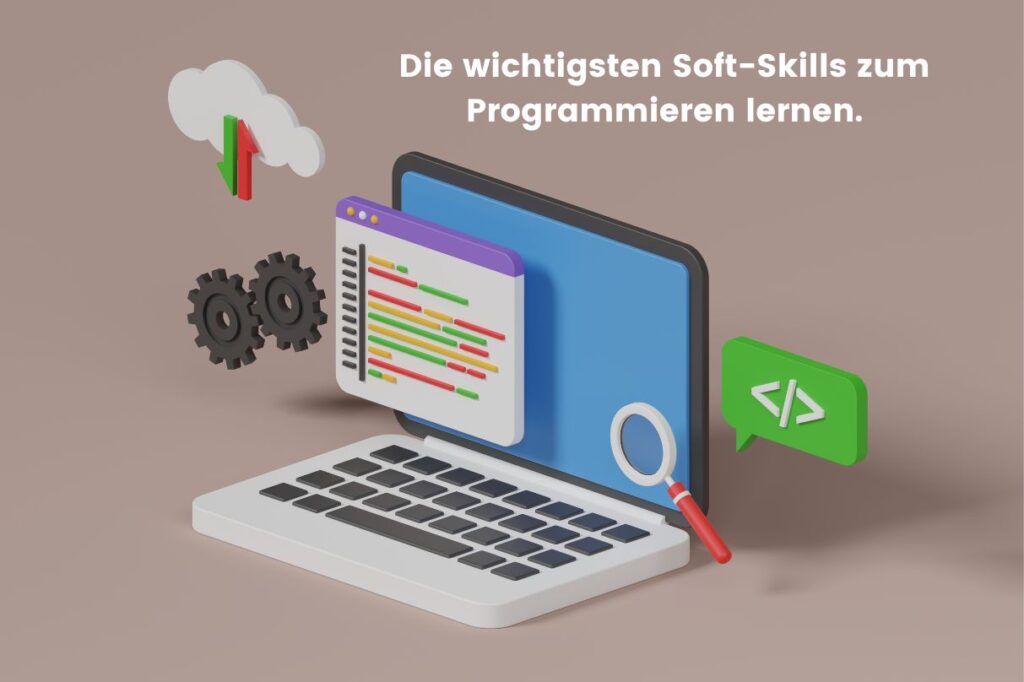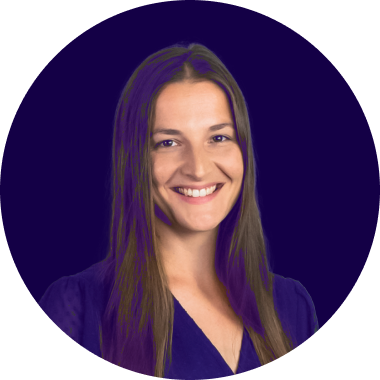Well-paid, future-proof and sought after in all industries. For many, programming is the most sought-after skill on the current job market. Many companies are desperately looking for programmers and are willing to pay above-average salaries due to the lack of trained specialists.
More and more job changers are therefore sensing their chance to make a lateral move and are asking themselves whether they would be suitable for a programming job. Even if mastering programming languages is indispensable for a job as a programmer, programmers must also have important non-technical qualities.
In this article we clarify which 10 soft skills you need to become a programmer and how you can successfully master your career as a programmer.
By the way: Thanks to Education voucher you can even get further training free of charge under certain conditions.

You need these soft skills if you want to learn programming
You are a:e problem solver:in
One of the most important skills when learning to program is your ability to solve problems logically. Often when programming, problems are broken down into sub-problems to be solved one at a time. This is because the main problem is often too complex to solve on its own at the first attempt. The division into subproblems leads to the fact that the individual subproblems can be worked off systematically one after the other, until the main problem is solved.
This approach is one of the most important skills in programming. Programmers often spend hours finding bugs in their own code. But also in other areas of life this approach to problem solving can be very helpful for you.
Another aspect is not to look for just one solution to the problem. There are usually many different solutions to a problem. Your task is to compare different possible solutions and to find the best possible solution for your problem by weighing them up.

Analytical thinking is exactly your thing
The soft skill of analytical thinking helps to establish connections between different facts, to structure and interpret them in order to be able to draw the right conclusions. Analytical thinking does not only describe the ability to solve complicated math problems. In addition, analytical thinking is put to the test much more frequently in practice through text analysis.
You are a creative mind
Programming requires creativity. Many problems cannot be solved simply by pure logic. It is necessary to look at the problem from different angles. This ensures that you are able to consider several possible solutions in order to find the best possible option for the corresponding problem. The more experience you get in programming, the more possible solutions you can think of for problems.

Empathy is not a foreign word for you
Empathy is a soft skill that is important in any profession. As a programmer, you should be able to put yourself in the shoes of potential users or customers in order to understand their problems and requirements. This helps you to understand a job and thus find the optimal software solution to simplify the lives of your customers or colleagues.
You are a:e team player:in
The stereotype that programmers mainly sit alone in front of their computers and type lines of code could not be further from reality. Programmers are constantly in contact with their colleagues, as different perspectives and approaches help to find the fastest and best possible solution to a problem. You rarely really work alone on projects. Programming is learning from and working with others.
Flexibility is Key
If you want to learn programming, you should quickly realize that there is rarely only one possible solution to a problem. Therefore, flexibility is an essential part of a programmer's skillset. In order to write good programs, you should be able to think flexibly and not be stuck on one solution approach from the beginning. The flexibility necessary for programming also develops automatically as you code more and gain experience.
You can handle criticism and setbacks
Unfortunately true: bugs will creep into any code you write. This is inevitable. Many mistakes you make while coding will most likely not be noticed by yourself, but by other people first. That's why it's important that you can handle criticism if you want to learn programming.
Errors in your code do not mean that all your code is bad. It is also quite normal that other people may find your errors before you do. You will notice fewer and fewer bugs as you work on code for a long time. This is normal, which should not stop you from working thoroughly and avoiding errors.
It will still happen that other people from your team suggest solutions that you didn't have in mind. However, this does not mean that you did a bad job. The more people involved, the more creative the solutions to various problems. Therefore, you should always accept constructive criticism with gratitude and try to learn from it and become better. You will surely be able to return the favor soon.
You research independently for possible solutions
You don't have to reinvent the wheel! For most problems, there are already open source solutions that you can integrate into your code. The art is to find the right code building blocks and to complement them with your own code and to correct errors that may have crept in. That programmers always write new code for every problem is a widespread misconception and fortunately unnecessary. Sometimes it is clever to use solutions that someone has already developed and made available.
You do not let yourself be crushed
Programming can sometimes be demotivating. You may spend many hours finding and correcting errors in your code, but the result still doesn't improve. Especially if you want to learn programming, a high level of patience and frustration tolerance is essential.
Learning to program is not easy and takes a lot of time. Especially in the beginning, when no fast progress is visible, the learning process can be very demotivating. But sticking with it is worth it. Once you have understood the basic principle and you have made progress in your first programming language, the fun of programming will not be long in coming.
You are technology savvy
To get started as a programmer, you should have a certain degree of affinity for technology. This means that you like to work with technology and quickly understand how it works. This will help you to better understand how your programs can be implemented in reality in the best possible way and may even give you new ideas about what you would like to work on.

How can you successfully master your career as a programmer?
If you have some of the above skills already perceived in yourself, nothing stands in the way of your entry as a programmer:in. Now it's about how you can turn your dream into reality.
There are many ways to learn programming. There are many free options on the web to learn coding basics, but we recommend you to get a proper training. If you learn the basics from professionals right from the start, your chances of becoming a successful programmer are simply better. If you are serious about becoming a programmer:in as soon as possible and you want to learn a frequently requested programming skill, we recommend you our Python Programmer Training and our SQL Training.
This part-time online course will enable you to work as a programmer after graduation. If you would like to learn more about why it is worthwhile for you to learn Python, read the following articles from us.
Sources
Learn Progrogramming(2020) "The 10 most important soft skills for coders" [22.06.2020]
Brainvestment(2021): " The 11 most important soft skills you train while learning programming" [06.112021]





